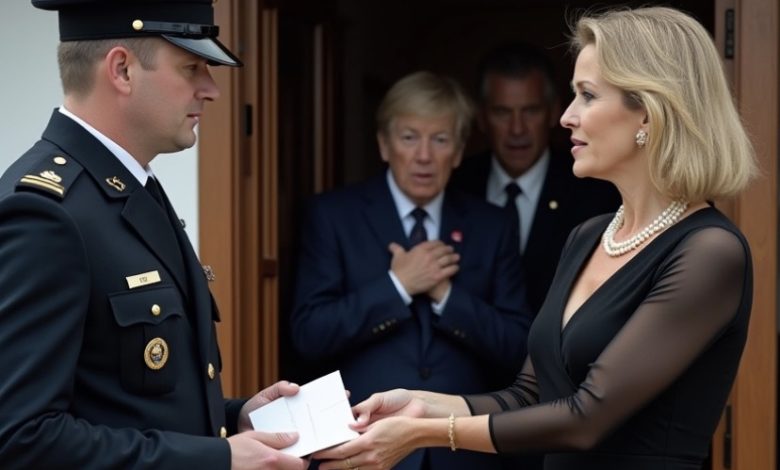“They Said I Didn’t Belong at the Ceremony, Until a Letter Changed Everything”

My husband’s family arranged a yacht trip to “honor” his late father, General Arthur Vance, a man celebrated not only as a decorated military leader but also as the pillar of the Vance dynasty. To the outside world, it looked like a graceful tribute. To me, it felt like a golden prison.
They didn’t invite me to be part of the private ceremony. They made sure everyone understood that I, Anna, the widow of David Vance—the General’s youngest son—was not considered “real” family. My husband had been different from his brothers: sensitive, artistic, uninterested in money or power. Because of that, they had always looked down on him. And since he chose me, I was treated with the same disdain.
Still, I boarded the yacht with dignity. It was a magnificent vessel, the kind you only see in glossy magazines—sleek white lines, polished decks, the smell of sea salt mixing with expensive champagne. But to me, it felt suffocating, like being trapped inside someone else’s story where I had no part.
The guests arrived one by one: politicians in tailored suits, retired generals with medals gleaming, wealthy donors and business tycoons. They weren’t here for the memory of a great soldier. They were here to shake hands with Marcus Vance, the General’s eldest son, and Eleanor, his elegant second wife. Together, they were eager to crown themselves as the rightful heirs to everything the General had built.
Before the ceremony began, Marcus approached me near the rail. His expression was full of rehearsed sympathy, his tone dripping with false kindness.
“Anna,” he said softly, “today will be very emotional. We’ll be reading Father’s final words. It’s a moment meant for blood relatives. It may be best for you to stay out here and take some fresh air. We wouldn’t want you to suffer needlessly.”
I heard the subtext loud and clear: You don’t belong with us.
Soon after, when all the guests had gathered in the main lounge, Marcus stood tall, holding a leather folio. “Thank you all for coming,” he said with his voice heavy with fake grief. “Now, if you’ll excuse us, the family wishes to share a private moment reading our father’s last letter.”
Eleanor turned toward me. Her black couture dress shimmered under the chandeliers, pearls catching the light. She leaned close, her words loud enough for everyone around to hear.
“Anna, dear,” she said sweetly, “this part is only for the immediate family. His blood relatives. It will be too emotional for you. I’m sure you understand.”
It wasn’t just exclusion. It was humiliation—deliberate and public. I felt the eyes of powerful strangers turn toward me, watching for a reaction, waiting for me to break.
But I didn’t.
I met Eleanor’s eyes with calm composure and gave a small, graceful nod. “I understand,” I said evenly.
Then I turned and walked onto the deck, leaving behind their smug satisfaction. My silence wasn’t surrender. It was strength.
The sea breeze wrapped around me, cooling my heated skin. I leaned against the rail and let the sound of the waves steady my heart. In that quiet moment, I remembered something the General himself once told me. Unlike the others, he had respected me. He had been the only one in that family to truly see David’s quiet strength.
“Courage comes in many forms, Anna,” he had said years ago, his voice steady. “Not every battle is fought on a battlefield.”
I held on to those words now like a lifeline.
Inside, I could faintly hear Marcus reading aloud. His voice carried through the lounge doors, filled with theatrical sorrow.
“I entrust my legacy to my son, Marcus,” he declared proudly, “whose strength and business wisdom will lead our family into the future.”
The guests murmured approvingly. Eleanor dabbed her eyes with a silk handkerchief. It was all a show.
But they had made a mistake.
They thought the sentimental letter Marcus was reading was the General’s true last word. They didn’t realize it was just a decoy. The real directive—the one with actual legal weight—was hidden somewhere else, waiting for the right moment to surface.
The General was no fool. He had been a five-star strategist, a man who could anticipate every possible move his enemies might make. He had known exactly what his family was capable of—their hunger for control, their greed for power. And he had planned accordingly.
That’s when it happened.
As I stood alone on the deck, lost in thought, a sharp voice called from behind me. “Mrs. Vance?”
I turned and saw a young officer, barely in his mid-twenties, standing straight as a post in full dress uniform. His eyes were serious, his manner precise.
He snapped a crisp salute. “Ma’am,” he said firmly, “we’ve found the letter the General left for you. The directive inside is effective immediately.”
For a moment, I couldn’t breathe. Then he held out a thick envelope sealed with dark red wax. My hands trembled as I accepted it.
I broke the seal and unfolded the letter. The General’s familiar handwriting stared back at me.
“Anna,” it began. “If you are reading this, then the moment has come. The Foundation must not fall into greedy hands. It was created to serve soldiers, not to feed ambition. You are the one I trust. Inside this envelope is a code. Call the number on the enclosed phone. Speak the code. Everything else will follow. David would be proud of you. — Arthur Vance.”
My chest tightened. The letter was short, but its weight was immense. Along with it was a small satellite phone. I pressed the single button, and after two short rings, a stern voice answered.
“Executor’s Office.”
“I have a directive to authenticate,” I said, forcing my voice steady. “Code Alpha-Victor-Seven-Niner-Tango-Zulu.”
“Confirmed,” the voice replied without hesitation. “Directive validated. Effective immediately. Notifications are being sent.”
The call ended.
At that very moment, inside the lounge, Marcus finished reading the fake letter. He raised his head proudly, expecting applause. And for a brief moment, he got it—polite clapping, nods of approval. But then his phone buzzed. Then Eleanor’s. Then the lawyer’s. One by one, the devices around the room lit up with urgent messages.
Confusion spread. Whispers turned to alarm. Marcus’s smile faded as he picked up his phone. His face drained of color.
“This is impossible,” he muttered. He called the lawyer at once. “What’s happening?”
The voice on the other end was frantic. “Marcus, it’s over! A Pentagon directive just came through. All authority over the Foundation has been stripped from you and Eleanor. It’s been reassigned.”
“To who?” Marcus demanded.
There was a pause. Then the lawyer whispered, “To Anna Vance.”
Marcus looked up, his eyes blazing with disbelief. He rushed to the deck, storming toward me, his fists clenched. “What did you do?” he shouted, his voice cracking.
I stood my ground, the General’s letter still in my hand. “I did nothing,” I said coldly. “The General made his choice. And now his true legacy is protected.”
“You’ll regret this!” Marcus spat. “I’ll fight you in court, I’ll destroy you!”
“The battle is already over,” I replied calmly. “You just lost.”
From that moment, everything unraveled for Marcus and Eleanor. They still had wealth, yes, but they lost what mattered most to them: influence. Without control of the Foundation, their connections evaporated. Their power collapsed like a house of cards.
For me, life changed in ways I never imagined. I wasn’t just the widow they once dismissed. I was now the guardian of something far greater—the General’s vision, the real Vance legacy.
Months later, I stood at a podium at the opening of the David Vance Rehabilitation Center, a facility for wounded veterans built with the Foundation’s funds. Behind me, the American flag fluttered in the breeze. Beside me, Lieutenant Davis—now my trusted aide—watched proudly.
I looked out at the rows of young soldiers, their families, the doctors and nurses who would care for them. My voice carried clearly across the courtyard.
“General Vance taught me that true honor isn’t about grand ceremonies or public displays. It’s about serving people. His legacy is not written in marble or gold—it lives in the lives we touch, the lives we change.”
The applause that followed wasn’t just polite. It was real. It was alive.
In that moment, I finally understood. My happy ending wasn’t about wealth or power. It was about purpose. By trusting me, the General had given me more than authority—he had given me a mission. And that was something no one could ever take away.










